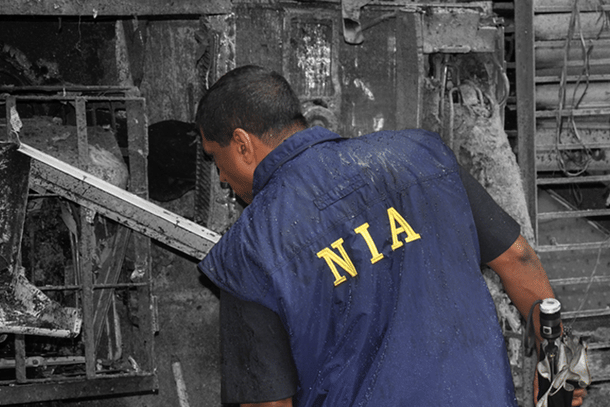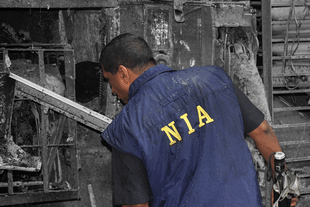News Brief
Why Home Minister Amit Shah’s Decision To Set Up A Full-Fledged NIA Office In Chennai Is Significant
M R Subramani
Sep 30, 2020, 01:37 PM | Updated 01:36 PM IST
Save & read from anywhere!
Bookmark stories for easy access on any device or the Swarajya app.


On Tuesday, the Ministry of Home Affairs announced that three additional branches of the National Investigation Agency (NIA) will be set up across the country, and one of them will be in Chennai.
The Amit Shah-headed ministry said that it will ensure quick response to any emergent situation in the concerned states by the country’s premier investigation agency.
It will also strengthen NIA’s capability in investigating terror-related cases and other issues of national security besides ensuring the timely collection of information and evidence relating to such offences.
Media reports said that the NIA will have a full-fledged office in Chennai with a strength of 80 to be headed by an officer of the Superintendent of Police rank.
The Home Ministry’s announcement has, generally, been welcomed in Tamil Nadu, particularly given the rise of separatist elements in the state.
Since the death of former chief minister J Jayalalithaa, Tamil Nadu has been witnessing one protest or the other starting from the demand to remove the ban on holding jallikattu (bullfight) to the protests against the Citizenship Amendment Act (CAA), 2019.
These protests have seen some groups with extremist views taking part in them. Of late, radical Islamist organisation Popular Front Of India (PFI) has become active through its political wing, Socialist Democratic Party of India (SDPI).
Also, Al Ummah, another terrorist organisation that has been involved in bomb blasts including in Bangalore, is active in the state.
SDPI supporters have indulged in violence, including the murder of people opposed to their views or conversion of Dalits in interior Tamil Nadu to Islam.
These incidents include the murder of a Pattali Makkal Katchi (PMK) member near Mayiladuthurai in Tamil Nadu’s Nagapattinam district last year and a special sub-inspector of police in Kanyakumari district early this year.
According to reports received by the Home Ministry, the PFI had actively organised protests against the CAA in various parts of the country, including Tamil Nadu especially Chennai.
On Monday, the Special NIA Court in Kochi sentenced to life an Islamic State of Iraq and Syria (ISIS) terrorist Subahani Haja Mohideen, who was arrested from Tamil Nadu’s Tirunelveli district in 2016.
The NIA has had to come from Kochi to Tamil Nadu to carry out search operations in various cases involving the ISIS and other separatist organisations.
The ISIS links were found to be also active in the Sri Lanka Easter blasts last year in which 277 persons, including eight suicide bombers, were killed. The NIA is now helping the Sri Lankan authorities in the probe into these blasts.
According to the United Nations, the ISIS is active in Tamil Nadu and is on a membership drive. The government has refuted this in Parliament last week, though.
Besides, the premier investigation agency is handling about 10 cases involving separatist elements in Tamil Nadu and Puducherry.
Recently, the NIA began to handle the case of abduction of a Chennai-based girl student from London, where she was studying, to Bangladesh. A popular Bangladesh politician’s son is allegedly involved in the abduction.
As the NIA has only a limited staff in Chennai without having a full-fledged office, investigations in these cases have been hampered. The full-fledged office will help NIA to have officers, legal advisers and other technical staff.
The setting up of the full-fledged office will help all first information reports of cases to be registered in Tamil Nadu and help in roping local personnel who are conversant with the language here.
The Chennai NIA office will likely have besides the superintendent, four deputy superintendents, two dozen inspectors and sub-inspectors besides constables.
The move to set up an NIA office is long overdue as Tamil Nadu, particularly Chennai, has witnessed quite a few attacks by organisations such as Al Ummah since 1993 when blasts rocked the Rashtriya Swayamsevak Sangh (RSS) office in Chetpet locality killing 13 people.
In 1998, a series of blasts in Coimbatore, when senior Bharatiya Janata Party (BJP) leader L K Advani visited the textile city, was triggered by Al Ummah killing 58 people and injuring over 250.
Another attempt was made on Advani near Madurai in 2011 by the Al Ummah, which has allegedly been targeting senior BJP leaders.
The move to set up the NIA office has generally been welcomed as a move to control fringe elements out to harm the country and its citizens.
M.R. Subramani is Executive Editor, Swarajya. He tweets @mrsubramani





